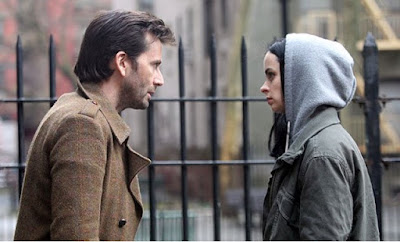Marvel comics have come a long way. Their cinematic universe is a powerhouse at the box office, and with the release of their Daredevil TV show on Netflix earlier in 2015 they released the best thing with the Marvel name on it. Now they follow that up with Jessica Jones, a character not that many folks, even comic nerds, know or know well. But since she was most famous for being the lead in the first Marvel comic rated for adults only, the Alias storyline on which this season of the show is based, I was intrigued when approaching the show. Knowing that former Doctor Who David Tennant would be the villain of the show, and that Krysten Ritter (who I liked as Jessie's OD'ing girlfriend on Breaking Bad) was our lead, I jumped in.
I was disappointed that the theme song wasn't the great, creepy, theme fitting song "Thousand Eyes" by Of Monsters and Men that was used in the trailer, but otherwise the opening credits are cool in their dark comic book imagery. And we meet Jessica, a hard drinking, cursing, unkempt, PTSD suffering private detective in New York City's Hell's Kitchen (also Daredevil's turf). She's spying on Luke Cage (Mike Colter), a local bar owner, whom she doesn't know yet is the great Marvel hero for hire with super strength and unbreakable skin. We also meet Jessica's best friend Trish (Rachael Taylor), a former child star turned talk radio personality who is seemingly the only friend in Jessica's life. Jessica's junkie neighbor Malcolm (Eka Darville), who is good hearted and shows it over the course of the series. And we get glimpses of what has caused Jessica's PTSD, that of being mind controlled by the evil Kilgrave (David Tennant), whose powers compel people for long periods of time even after leaving his presence. Jessica gets roped into the case of Hope Shlottman (Erin Moriarty) a girl who disappeared and Jessica is convinced is being controlled by Kilgrave.
This sets up the modern noir-ish tone of much of the series, as Jessica is forced to confront her former controller. And the show as a whole is really, daringly for this type of programming, an examination of the effects of abuse and recovery. Jessica, Hope, Malcolm, and Kilgrave's other victims we meet are all dealing with the remains of their lives once Kilgrave's abuse (verbal, physical, sexual) enters their lives and destroys who they used to be. They're all trying to heal, and move on, in many different ways. I believe this depth of material to be what makes the show so strong overall. We have comic book movies like X-Men that are metaphors for racism or homosexuality but none that tackle a sensitive subject like abuse with the head on manner that Jessica Jones does. And it's not all just reading into it, as they explicitly refer to Kilgrave as a rapist, abuser, and murderer. And again this is what makes the show so fascinating.
Kilgrave is not seen as simply a monster, he's given explanation and motivation as a character. With his powers, people are compelled to do whatever he tells them to do, no matter if it is harmful to themselves or others. What kind of moral compass must this have developed as the young man grew up? The show hints that any one of us could go down the road Kilgrave has, if we were to feed those darker thoughts and aspects of our human nature. And Kilgrave himself even says at one point that because of his powers he must choose his every word very carefully "I once told a man to go screw himself. Can you even imagine?" But the show doesn't let Kilgrave off the hook just because it tries to understand him a bit, we are all still responsible for our actions (unless we were one of the many victims Kilgrave leaves in his wake). And David Tennant, creating easily the best villain in the Marvel Cinematic Universe, gives Kilgrave the depth, nastiness, humor, petulance of a child always used to getting his way, a certain pathetic-ness that makes us pity him, and even a few moments where you wonder if he could turn it around if given the right direction (which he didn't/couldn't get from his parents if he was always telling them what to do). It's wonderful work from both the creative team behind the scenes, and especially Tennant himself who is magnetic every second we see him.
But the show has great acting all around, from Mike Colter's terrific Luke Cage to Carrie-Anne Moss as Jeri Hogarth, a high powered attorney who hires Jessica's PI skills from time to time. But it's all headlined by Krysten Ritter, who really shines and embodies this broken woman. We believe her fragility as well as her determination to not let Kilgrave keep going. She must have revenge for the abuse that was done to her. But the series also shows us that this isn't the way for everyone. Jessica must get revenge for what was done to her just as much as for the responsibility she feels falls on her for every new victim that arises as she doesn't exact her revenge.
Overall, I would say that the series is much deeper than Daredevil was, even if it's not as entertaining (I mean, Daredevil was essentially a season long action movie, and a great one). But I think it's much more interesting and worth delving into, as no screen comic property has dived into the implications of what having these various powers would actually be like. No movie or show has ever cared this much about the psychology or the real human effect of what being a superhero or villain really is.






No comments:
Post a Comment